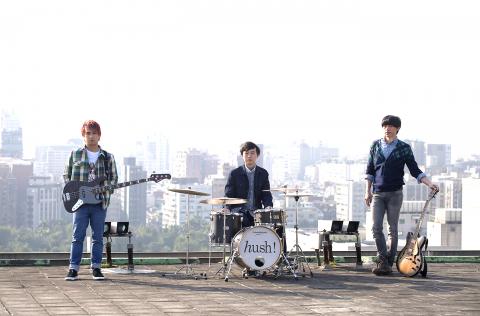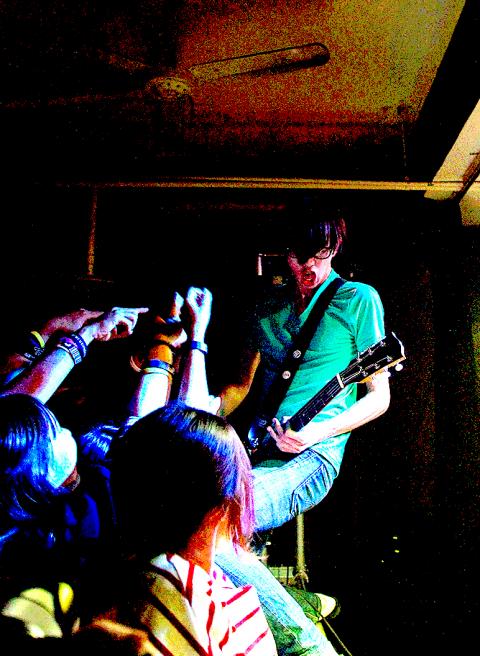Happy New Year. There, I said it. Now that that’s out of the way, music is always about issues. Those issues could be political or they might be personal, but they are always at the core of any music that might call itself relevant. Pop rock might not be the first musical genre that comes to mind when you think of bands tackling socially conscious themes, but local act Hush! (樂團) could change that perception.
Hush! started out three years ago, and was founded by singer/songwriter Hush Chan (陳家偉). The three-piece group, laidback both musically and in person, is rounded out by drummer Bear Xie (謝曜輿) and bassist Cabeza Yu (余謹匡). They released a full-length album, X, not long after getting together. That album was based around Chan’s knowledge of reading Tarot cards, a craft he studied for eight years. Now, Hush! has a new album to promote, Psycho Love (異常現象). This record, says Chan, is about someone who has never been loved discovering the emotion for the first time. At first glance, it seems like standard pop fare, but bear with me.
Here’s where things take a turn from the typical pop-rock schlock. Same-sex marriage has become a hot-button issue in Taiwan of late, with mass protests both for and against taking place on city streets. Certain members of the pop community have come out in support of gay marriage, with A-mei (張惠妹) holding a concert paid for out of her own pocket to rally fans and show that many believe homosexuals should be given equal rights when it comes to matrimony. Hush! has also emerged with a strong showing of support of their own. The band’s video for the track Lovers in the Sky (空中的戀人), one of the singles off Psycho Love, features what could be the first openly gay love story in Taiwan music video history, culminating in a man bending down on one knee to place a ring on the finger of another man.

Photo courtesy of Re:public Records
“We tried to support this,” Chan says. “That song is talking about two guys who can’t be together, but they love each other.”
Call it one giant progressive leap forward for the music scene in Taiwan, and here’s hoping more bands come out in support of logic rather than pseudo-religious bigotry and willful ignorance. End rant. It might be pop-rock, but that doesn’t make it mindless. Far from it. Chan wants to make people feel; to make them examine themselves and the world around them, and experience equality that transcends many different levels.
“I enjoy watching fans smiling, or crying, or thinking,” Chan says of his observations of the crowd during shows. “I enjoy the atmosphere that we’re friends, no matter you’re on stage or not.”

Photo courtesy of Shawn Carson
■ Hush! stages its final CD release show in support of Psycho Love tomorrow at The Wall, B1, 200, Roosevelt Rd Sec 4, Taipei (台北市羅斯福路四段200號B1). Doors open at 7:30pm and the show starts at 8pm. Tickets are NT$400 in advance, NT$450 at the door.
Now on to issues of a more personal nature. This Saturday will also see a performance by fast-rising Taipei-based pop-punk act Destroyers (擊沈女孩). The band, started by guitarist/singer Jon Hom, a transplant from Los Angeles, and drummer Lee Joseph Weatherall (魏敦華), only got together in late 2011, but has already released a string of three independently produced EPs and played somewhere in the neighborhood of 40 gigs in 2012. Completed by bassist Johnny Kao (高華聰) and guitarist Dawei Liu (劉哲麟), Destroyers is known for cranking out hooky, irreverent three-chord punk numbers about drinking and partying inspired by the likes of California pop punk progenitors like Green Day and Blink-182, but the band has taken a slight turn towards the introspective of late.
“This has been the worst year of our lives,” Hom says, remarking on how more than one member of Destroyers suffered more than his fair share of heartache in 2012, leading to a shift to songs that are a bit more serious. But don’t expect Destroyers to go all brooding and sullen on their next release, a full-length album slated to come out at an as-yet indeterminate date this year. The music is still mostly about having a good time — an approach that has won the band a solid bedrock of support throughout Taiwan.
“If you can’t play your own songs happily,” Weatherall explains, “it’s really hard to convince the people down there that the song is good. What I like about us playing is that we look at each other during the shows.”
“We’ve actually been made fun of for that,” Hom continues. “People in Kaohsiung accused me of being gay for sticking my tongue out to these guys.”
Maybe the punk scene could take a lesson from the pop-rock scene in that regard. Nevertheless, Destroyers is an airtight live act, with a synchronicity made possible by the fact that the band members actually enjoy each other’s company after hours, hanging out whether they have a rehearsal or a show or not. Hom, a veteran of both the Los Angeles and the Taiwan music scenes, has always been looking for that group of musicians with the chops as well as the right combination of personalities.
“I always wanted to be in a band with my best friends,” he says earnestly. “Now, I feel like I’ve finally found it. If I stopped, I’d probably kill myself from boredom.”
■ Destroyers plays as part of the Demo Record tour package tomorrow at Pipe Live Music (派比義大利音樂餐廳), 1 Siyuan Street, Taipei (台北市中正區思源街1號). Doors open at 3:30pm and the show starts at 4pm. Tickets are NT$300 in advance, NT$350 at the door.

As Taiwan’s second most populous city, Taichung looms large in the electoral map. Taiwanese political commentators describe it — along with neighboring Changhua County — as Taiwan’s “swing states” (搖擺州), which is a curious direct borrowing from American election terminology. In the early post-Martial Law era, Taichung was referred to as a “desert of democracy” because while the Democratic Progressive Party (DPP) was winning elections in the north and south, Taichung remained staunchly loyal to the Chinese Nationalist Party (KMT). That changed over time, but in both Changhua and Taichung, the DPP still suffers from a “one-term curse,” with the

William Liu (劉家君) moved to Kaohsiung from Nantou to live with his boyfriend Reg Hong (洪嘉佑). “In Nantou, people do not support gay rights at all and never even talk about it. Living here made me optimistic and made me realize how much I can express myself,” Liu tells the Taipei Times. Hong and his friend Cony Hsieh (謝昀希) are both active in several LGBT groups and organizations in Kaohsiung. They were among the people behind the city’s 16th Pride event in November last year, which gathered over 35,000 people. Along with others, they clearly see Kaohsiung as the nexus of LGBT rights.

Jan. 26 to Feb. 1 Nearly 90 years after it was last recorded, the Basay language was taught in a classroom for the first time in September last year. Over the following three months, students learned its sounds along with the customs and folktales of the Ketagalan people, who once spoke it across northern Taiwan. Although each Ketagalan settlement had its own language, Basay functioned as a common trade language. By the late 19th century, it had largely fallen out of daily use as speakers shifted to Hoklo (commonly known as Taiwanese), surviving only in fragments remembered by the elderly. In

Dissident artist Ai Weiwei’s (艾未未) famous return to the People’s Republic of China (PRC) has been overshadowed by the astonishing news of the latest arrests of senior military figures for “corruption,” but it is an interesting piece of news in its own right, though more for what Ai does not understand than for what he does. Ai simply lacks the reflective understanding that the loneliness and isolation he imagines are “European” are simply the joys of life as an expat. That goes both ways: “I love Taiwan!” say many still wet-behind-the-ears expats here, not realizing what they love is being an